In the last article, we introduced China’s fan economy’s development process and the division of labor among fans in the Fan Circle. We learned about the new customer clusters with colossal influence and consumption power. In this article, we will briefly introduce fan e-commerce. We will let everyone realize how the brand should interact with fans benignly and create a win-win cooperation model through several specific idol marketing cases.
1. The idol e-commerce model has become the new favorite of big brands
According to the previous article, buying products endorsed by idols is currently a prominent consumer behavior of fans, and it is eye-catching in terms of consumer spending. The emergence of the idol-chasing platform provides new ideas for advertisers and brand owners to locate potential consumer groups accurately. Idol-chaser platforms have massive fan traffic, and these fans also prefer products recommended or endorsed by new generation idols, and they are more willing to shop online. Through more effective content promotion and more diverse fan interactions, idol e-commerce companies can help the brand realize traffic conversion to sales.
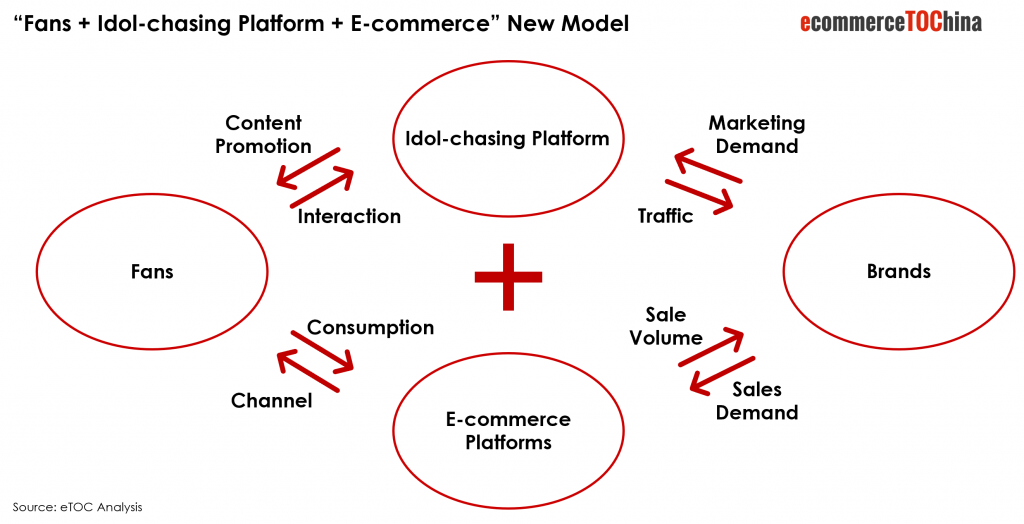
2. Brands’ new ideas for playing in idol industry
As the idol industry has become more and more popular in China, brands have also rushed to develop the fan economy fully. From reality shows to celebrity co-branding, from product customization to virtual idols, we will briefly introduce the brand idol marketing cases currently in full swing in China. Everyone can understand the power of the fan circle more intuitively.
2.1. Variety show title sponsorship
The popular idol development variety show “Idol Trainee” in 2018 kicked off the first year of the Chinese idols and gave its sponsor Nongfu Spring a bumper harvest. Its vitamin water, which was the main product of the year, became the sales champion.
In addition to the various forms of products exposed in the show, the company also introduced explosive traffic to the Tmall flagship store. Fans purchase the “Idol Trainee” limited edition vitamin water and mineral water launched by the exclusive title dealer Nongfu Spring on Tmall to obtain additional voting coupons, the “water tickets” in the fans’ mouths, to vote for their favorite idol trainees. Through the voting activities during this period, it is reported that the sales of the Nongfu Spring Tmall flagship store has increased 500 times, and the vitamin water in many stores were out of stock many times.
In addition to the various forms of products exposed in the show, the company also introduced explosive traffic to the Tmall flagship store. Fans purchase the “Idol Trainee” limited edition vitamin water and mineral water launched by the exclusive title dealer Nongfu Spring on Tmall to obtain additional voting coupons, the “water tickets” in the fans’ mouths, to vote for their favorite idol trainees. Through the voting activities during this period, it is reported that the sales of the Nongfu Spring Tmall flagship store has increased 500 times, and the vitamin water in many stores were out of stock many times.
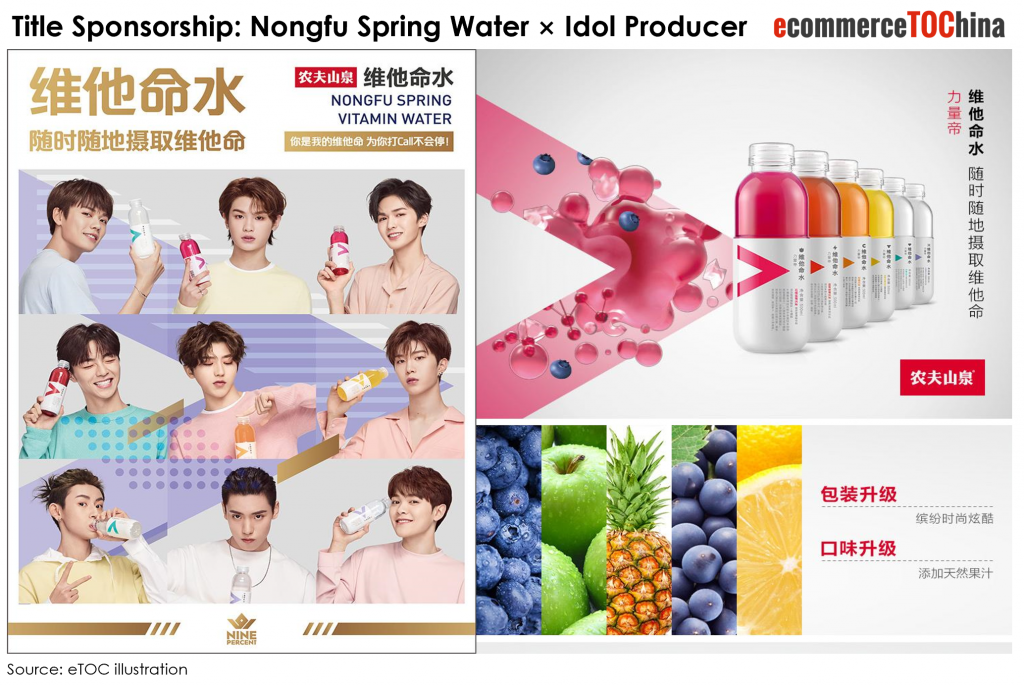
2.2. Customized products and IP related products
In addition to being on track from the moment the player debuted in the draft. For idols who have already debuted, brands can also form a benign interaction with them. For example, Ambrosial launched the “Super Burning Support Station” activity in May, inviting fans to customize unique Ambrosial products and peripherals for Cai Xukun, Wang Yibo, Di Lieba and Angelababy.
The brand conforms to the current trend, gives fans the identity of “creative chiefs,” and guides fans into the WeChat official account through the brand’s official Weibo to vote for idols’ exclusive tastes, slogans, and ICON. At the same time, benefits will be increased during the event to encourage dissemination further. If fans can vote to reach the specified number of levels, not only can they unlock the mysterious gifts and unique easter eggs of the stars, they can also participate in the lottery and get the idol surprise surroundings.
Through voting and proposal solicitation activities, Ambrosial fully considers fan preferences and respects fans’ supporting culture; on the other hand, it allows fans to transform from consumers into co-builders of the brand, creating exclusive products’ own circles, and establishing emotional connections. In the end, the idol fans were transformed into brand advocates and disseminators in a “heart-conscious way”.
The brand conforms to the current trend, gives fans the identity of “creative chiefs,” and guides fans into the WeChat official account through the brand’s official Weibo to vote for idols’ exclusive tastes, slogans, and ICON. At the same time, benefits will be increased during the event to encourage dissemination further. If fans can vote to reach the specified number of levels, not only can they unlock the mysterious gifts and unique easter eggs of the stars, they can also participate in the lottery and get the idol surprise surroundings.
Through voting and proposal solicitation activities, Ambrosial fully considers fan preferences and respects fans’ supporting culture; on the other hand, it allows fans to transform from consumers into co-builders of the brand, creating exclusive products’ own circles, and establishing emotional connections. In the end, the idol fans were transformed into brand advocates and disseminators in a “heart-conscious way”.
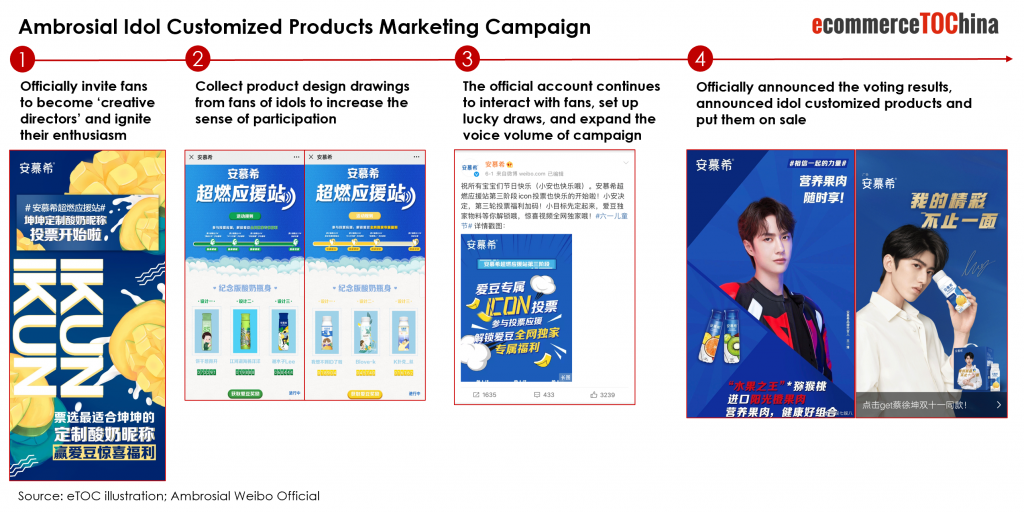
2.3. Virtual idols extend the boundaries of idols again
On August 28 this year, China’s largest e-commerce platform Tmall announced the platform’s second spokesperson – “Qian Mew” – the virtual character of Yi Yang Qianxi (the first spokesperson is Yi Yang Qianxi himself). In fact, it’s not just Yi Yang Qianxi. In recent years, more and more celebrities have had their own virtual character, such as Huang Zitao’s “ZTao’s man”, Di Lieba’s “Di Li Lengba”, and Zhang Yixing’s “Little Z”……
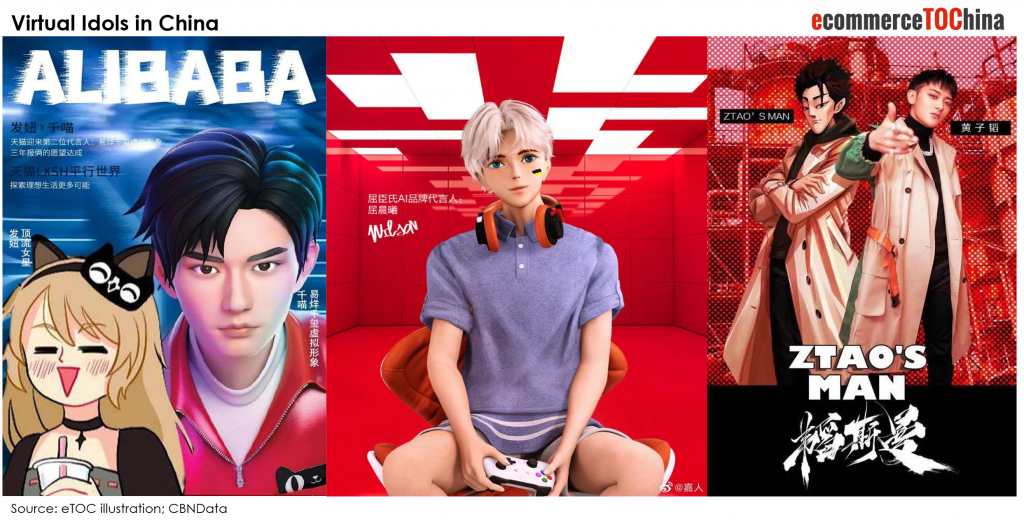
On the one hand, virtual idols are not restricted by time and space. The virtual idols cater to the younger generation’s preference as the ACG (animations, comics & games) culture becoming more and more popular in China. Fans are able to engage and express their love to the idols in virtual world. Secondly, virtual idols help brand create a new language for communication.
On the other hand, an idol with multiple brand endorsements is already the norm, under such circumstances, consumers will inevitably have cognitive ambiguities and deviations. Virtual idol figure provides flexible solution that is able to be created and adjusted to match the brand needs. The uniqueness of the virtual idol makes the brand more recognizable. Brands can also further form unique brand cognition and convey brand values by shaping virtual idols.
On the other hand, an idol with multiple brand endorsements is already the norm, under such circumstances, consumers will inevitably have cognitive ambiguities and deviations. Virtual idol figure provides flexible solution that is able to be created and adjusted to match the brand needs. The uniqueness of the virtual idol makes the brand more recognizable. Brands can also further form unique brand cognition and convey brand values by shaping virtual idols.
3. Step by step fans activation path
The activation and operation of fans is usually a series of long-term marketing activities, from the early events releasing to traffic importing and encouraging purchases in the middle stage, to the repurchase recommendation after-sales. Each step requires specific undertaking platforms and interactive content. Brands need to consider the Fan Circle culture of different idols and different platforms’ atmosphere, providing differentiated marketing content to increase the user conversion rate and repurchase rate at each stage.
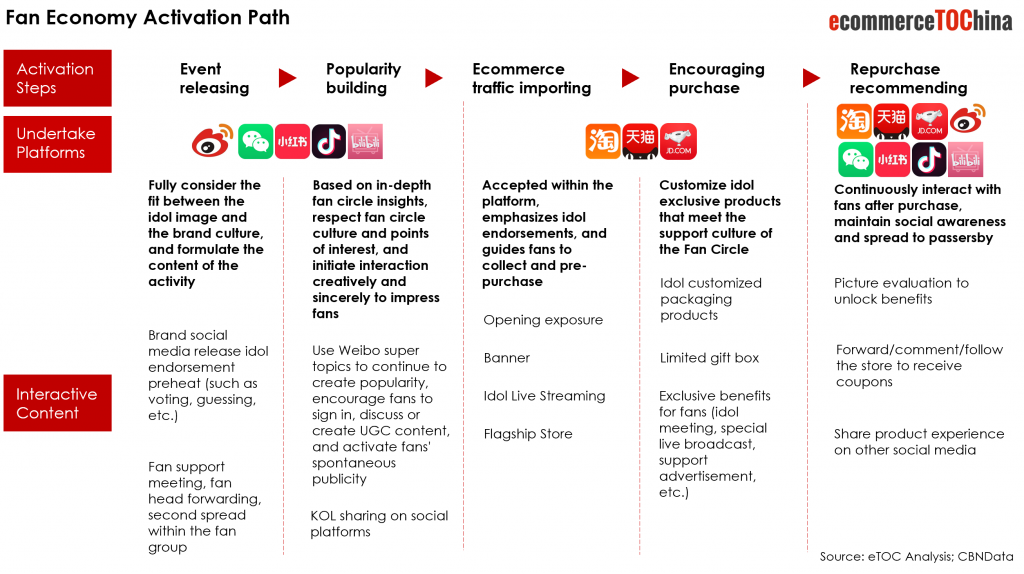
4. Key Takeaways:
As the fan economy becomes more and more prosperous, more and more brands are aware of the business opportunities, and celebrity cooperation emerges endlessly. While the fans are overwhelmed, they are also tired of the gradual simplification of celebrity recommendations.
When a brand chooses an idol, popularity is the base, and sales conversion is the result. Brands need to rethink how to go deep into the Fan Circle, understand its unique culture, dig deep into the emotional resonance, apply it to marketing campaign design and product communication, use all channels to activate fan’s love, and ultimately detonates product sales.
When a brand chooses an idol, popularity is the base, and sales conversion is the result. Brands need to rethink how to go deep into the Fan Circle, understand its unique culture, dig deep into the emotional resonance, apply it to marketing campaign design and product communication, use all channels to activate fan’s love, and ultimately detonates product sales.

Discover the Future of Shopping with "Shopatainment – The Future of Shopping"
Our new book “Shopatainment – The Future of Shopping” explores how the innovative fusion of shopping and entertainment is revolutionizing the way we shop. Learn about the origins of this trend in China, the technologies and formats being used, and the opportunities and challenges it presents for the West.

Want to have a first free consultation session about e-commerce and digital marketing in China? Contact us.
